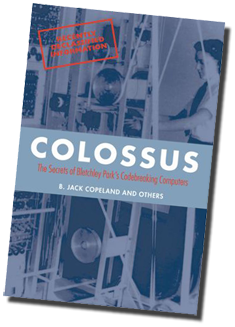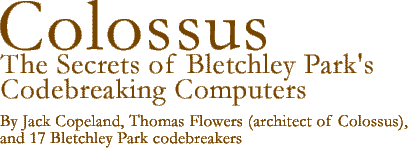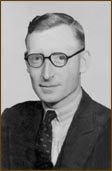


 | ||
|
“Highly recommended. The human interest woven into the narrative should make it appealing to a broad audience.” Choice “absolutely fascinating” popularscience.co.uk “Copeland’s valuable collection brings together both technical commentary and personal narratives in an engaging book that will be essential reading for historians of twentieth-century technology and warfare.” Jon Agar in Nature “The Colossus of codes. Not until 2000 did the government finally declassify a 500-page document called ‘General Report on Tunny’, written at the end of the war, which spells out in some detail how Colossus worked. Copeland seized the opportunity to tell the full story. Formidably detailed… has the great advantage that he has gathered first-person accounts from many of the protagonists, which provide a wealth of colour. Read… to feel the collective power of human minds harnessed to the cause of defending our freedom.” Georgina Ferry in the Guardian “This is a festschrift for a machine: the world’s first electronic digital computer and a critical, perhaps the critical, element in the Allies’ victory over Germany in the second world war. The codebreakers of Bletchley Park have already inspired a clutch of books and articles but these have traditionally focussed on their success in breaking the German ‘Enigma’ cipher. Now, aided by the declassification of previously secret material, Jack Copeland and his army of co-authors, many of them directly involved in the Bletchley operation, tell the bigger story: how Colossus was used to break an even more secret cipher machine, called Tunny by the British, which carried the highest grade of German Intelligence. The book is much like Colossus itself… a workmanlike job. The Colossus architect T. H. ‘Tommy’ Flowers and the mathematicians and cryptanalysts, among them Alan Turing and Bill Tutte, stand out as the heroes of the hour.” Alan Cane in the Financial Times Weekend Magazine “Weighing one ton and filling a room, the aptly named Colossus was designed to break an ultra-secret cipher codenamed Tunny. Far more advanced than the well-known Enigma cipher, Tunny was used to relay messages between Hitler and his generals, and to convey vital information about the Nazi war machine. Total secrecy surrounded Bletchley Park’s work on Tunny: the purpose and operation of Colossus remained highly classified until now. Copeland et al. draw on a wide variety of sources to paint a complete picture of Colossus… It is an outstanding, enjoyable book that belongs in your personal library and would also be a long remembered gift.” Louis Kruh, editor of the cryptology journal Cryptologia “Breaking Tunny traffic was the greatest code-breaking feat of the war. Colossus should put paid to myths that are still so prevalent… This book will appeal to anyone interested in Colossus, code-breaking or Bletchley Park. Copeland and the other contributors have rightly done Flowers and the Tunny code-breakers proud.” Ralph Erskine in the Times Higher Educational Supplement “Copeland, Director of the Turing Archive for the History of Computing and author of some very good books on Alan Turing, has collected an amazing amount of information on Colossus. This is an important book.” Books-On-Line “Jack Copeland, the director of the Turing Archive, marshals a multilayered, broad picture of Bletchley’s work and personalities, using contributions from eye-witnesses and such dab hands as Simon Singh, Stephen Budiansky and Michael Smith.” Will Cohu in the Telegraph
ISBN 0-19-284055-X (Hardcover) ISBN 0-19-957814-X (Paperback)
Copyright © 2010 Jack Copeland
|
 Flowers was speaking in his quiet, modest way (writes Jack Copeland). He was telling me about the giant electronic computer he had built for codebreaking during the war. The story was riveting. “There should be a book about Colossus”, I suggested.“A book about Colossus...”, he said softly, almost disbelievingly. His computer’s role in the Allied victory had been secret for so long. I began the search for the codebreakers who could provide the rest of the complex picture. People said “We can‘t talk about a lot of it—Official Secrets Act”. But then British Intelligence declassified a crucial wartime report: 500 pages of previously ultra-secret material. Suddenly doors opened and tongues loosened. More...
| |